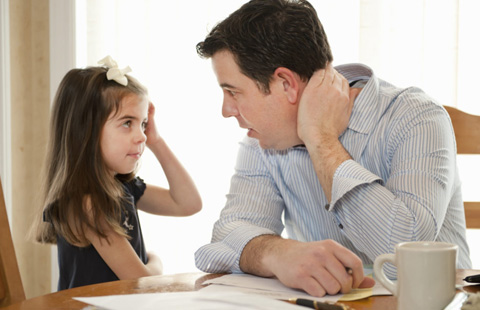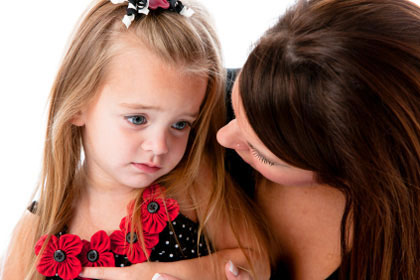Dealing with the prospect of their parents splitting up is hard for any child, but you can ensure that your children undergo minimal pain and uncertainty by preparing carefully before breaking the news to your child. Dropping the dreaded ‘D’ word upon your innocent little children is a mission that most parents in the situation fumble at. Divorce is a double-edged sword, harming all involved in the process. Children are the collateral damage in every divorce. In order to minimise the damage caused to yourself and your children, it is necessary to prepare carefully before telling them about the impending divorce. In order to help your children process the news better; anticipate difficult questions, sort out your own apprehensions about the future, plan which details to share and which to withhold before talking to them. In this articleBoth Parents Should be Present for the AnnouncementBe HonestKeep Their Age in Mind While Sharing Details of the Divorce Say “We Love You.†Avoid BlamingProvide Details about the Changes to ComePlan Changes in ArrangementsReassure Your Children EmotionallyAvoid Creating Abandonment IssuesDo Not Give them False HopeWhat to Say and How? Your children deserve to know the truth but you need to make it child-friendly. Show empathy but discuss the important issues upfront. Both Parents Should be Present for the Announcement It is important that you and your spouse put aside all your disagreements for the sake of your children and present a united front. Jointly come up with an agreeable explanation for your divorce before telling your children; and try to stick to it no matter what. Presence of both parents comforts children and shows them that while their parents’ relationship may be changing, they are not losing either of their parents with the divorce. Do not use the announcement as a way to blame your spouse as this will traumatise your children unnecessarily. Be Honest As part of the family, your children are entitled to know that there is going to be a major change in the family dynamic. Tell them that you are getting a divorce gently but do not beat around the bush about it. Simply explain that you and your spouse can no longer get along. Avoid getting into long winded rants about who is at fault. Keep Their Age in Mind While Sharing Details of the Divorce Younger children are normally satisfied with simple explanations but teenagers may demand more information. If you decide to share more details, endeavour not to spoil either parent’s image in your children’s eyes. Say “We Love You.†It may seem simplistic, but it is an important powerful message that your children need to hear. Assure them that while your feelings for your spouse may have changed, both you and your spouse will always love and care for them. Avoid Blaming When there have been heartbreaking incidences like infidelities, it is difficult not to blame your spouse in front of your child. But it is important that you show restraint and be respectful to your spouse while explaining the divorce to your child. Provide Details about the Changes to Come Foresee the questions your children will have about where they will be living and with which parent. Prepare your child by acknowledging that some things will be different now, and that you will take their opinion in making the decisions wherever possible. Plan Changes in Arrangements Discuss the living situation with your children before making the changes. Your children should not have to wake up one day and find that their father has taken his belongings and vanished. Share basic logistical information such as changes in school schedules and extra-curricular activities, etc. Reassure Your Children Emotionally Many children blame themselves for their parents marital problems. They mistakenly assume that the divorce is a result of their bad academic performances, arguing with parents, misbehaving, etc. Often children end up believing that one of their parents do not love them anymore which is why they are leaving the house. These are very real fears and need to be treated by constantly reassuring them that they are loved and not to blame for marital problems. Avoid Creating Abandonment Issues Provide specific details about the parent who is leaving the home. If possible, both parents should try staying in the same home for at least a day or two after telling your child. Additionally, invite your child and your ex-spouse together for a meal at your new house after settling in. This will comfort you child by showing that while family dynamics are different now, the child will still be able to maintain loving relationships with both his parents. Do Not Give them False HopeJust because divorce is difficult for you and your children to deal with, do not give your children the impression that there might be a possibility of you and your partner working things out. This hope only helps in creating more bitter disenchanted children that blame you for all their problems. Expect your children to have a lot of new questions and concerns over time. Answer truthfully as far as possible and admit you do not know the answer when you don’t. Give your children some time and space to adjust to the news. Help your children cope with the divorce by being patient and making an effort to ensure the steady presence of both parents in their lives.

Dealing with the prospect of their parents splitting up is hard for any child, but you can ensure that your children undergo minimal pain and uncertainty by preparing carefully before breaking the news to your child. Dropping the dreaded ‘D’ word upon your innocent little children is a mission that most parents in the situation fumble at.
Divorce is a double-edged sword, harming all involved in the process. Children are the collateral damage in every divorce. In order to minimise the damage caused to yourself and your children, it is necessary to prepare carefully before telling them about the impending divorce. In order to help your children process the news better; anticipate difficult questions, sort out your own apprehensions about the future, plan which details to share and which to withhold before talking to them.
What to Say and How?
Your children deserve to know the truth but you need to make it child-friendly. Show empathy but discuss the important issues upfront.
Both Parents Should be Present for the Announcement
It is important that you and your spouse put aside all your disagreements for the sake of your children and present a united front. Jointly come up with an agreeable explanation for your divorce before telling your children; and try to stick to it no matter what. Presence of both parents comforts children and shows them that while their parents’ relationship may be changing, they are not losing either of their parents with the divorce. Do not use the announcement as a way to blame your spouse as this will traumatise your children unnecessarily.
Be Honest
As part of the family, your children are entitled to know that there is going to be a major change in the family dynamic. Tell them that you are getting a divorce gently but do not beat around the bush about it. Simply explain that you and your spouse can no longer get along. Avoid getting into long winded rants about who is at fault.
Keep Their Age in Mind While Sharing Details of the Divorce
Younger children are normally satisfied with simple explanations but teenagers may demand more information. If you decide to share more details, endeavour not to spoil either parent’s image in your children’s eyes.
Say “We Love You.â€
It may seem simplistic, but it is an important powerful message that your children need to hear. Assure them that while your feelings for your spouse may have changed, both you and your spouse will always love and care for them.
Avoid Blaming
When there have been heartbreaking incidences like infidelities, it is difficult not to blame your spouse in front of your child. But it is important that you show restraint and be respectful to your spouse while explaining the divorce to your child.
Provide Details about the Changes to Come
Foresee the questions your children will have about where they will be living and with which parent. Prepare your child by acknowledging that some things will be different now, and that you will take their opinion in making the decisions wherever possible.
Plan Changes in Arrangements
Discuss the living situation with your children before making the changes. Your children should not have to wake up one day and find that their father has taken his belongings and vanished. Share basic logistical information such as changes in school schedules and extra-curricular activities, etc.
Reassure Your Children Emotionally
Many children blame themselves for their parents' marital problems. They mistakenly assume that the divorce is a result of their bad academic performances, arguing with parents, misbehaving, etc. Often children end up believing that one of their parents do not love them anymore which is why they are leaving the house. These are very real fears and need to be treated by constantly reassuring them that they are loved and not to blame for marital problems.
Avoid Creating Abandonment Issues
Provide specific details about the parent who is leaving the home. If possible, both parents should try staying in the same home for at least a day or two after telling your child. Additionally, invite your child and your ex-spouse together for a meal at your new house after settling in. This will comfort you child by showing that while family dynamics are different now, the child will still be able to maintain loving relationships with both his parents.
Do Not Give them False Hope
Just because divorce is difficult for you and your children to deal with, do not give your children the impression that there might be a possibility of you and your partner working things out. This hope only helps in creating more bitter disenchanted children that blame you for all their problems.
Expect your children to have a lot of new questions and concerns over time. Answer truthfully as far as possible and admit you do not know the answer when you don’t. Give your children some time and space to adjust to the news. Help your children cope with the divorce by being patient and making an effort to ensure the steady presence of both parents in their lives.

































